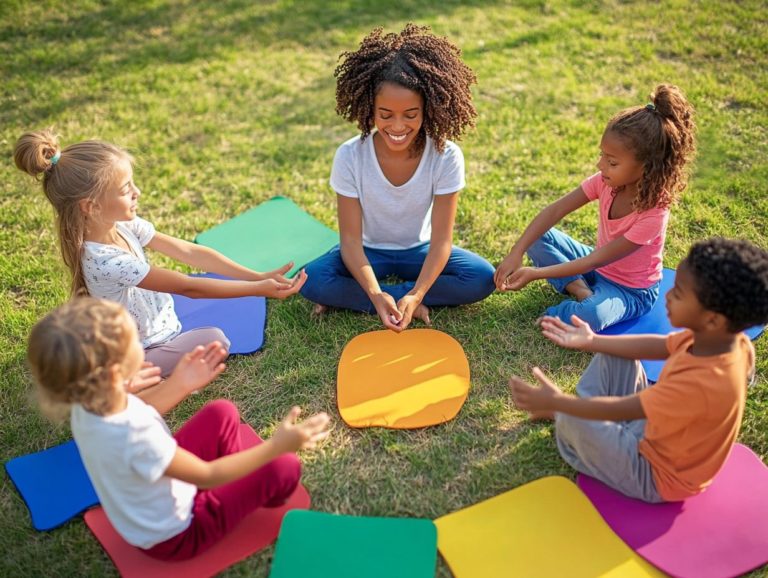10 Mindfulness Strategies for Challenging Days
In today s fast-paced world, you may find that stress and anxiety can feel overwhelming, often making it difficult to maintain balance and mental clarity.
Embracing mindfulness provides you with powerful strategies to navigate these challenging moments with grace and resilience, enhancing your stress management toolkit.
This article delves into ten practical mindfulness techniques, ranging from cultivating a mindful morning routine to incorporating gratitude, self-care, and mindful eating into your day.
By integrating these strategies into your daily life, you can foster a deeper connection with yourself, enhance your well-being, and cultivate a more peaceful mindset amidst the chaos.
Contents
- Key Takeaways:
- 1. Start Your Day with a Mindful Morning Routine
- 2. Practice Gratitude
- 3. Take Breaks to Breathe and Re-center
- 4. Focus on the Present Moment
- 5. Use Mindful Reminders
- 6. Engage in Mindful Movement or Exercise
- 7. Practice Mindful Eating
- 8. Take Time for Self-Care
- 9. Use Mindful Communication
- 10. End Your Day with a Mindful Reflection
- What Is Mindfulness and How Can It Help During Challenging Times?
- What Are Some Common Mindfulness Practices?
- How Can One Cultivate a Mindful Mindset?
- Frequently Asked Questions
- What are some mindfulness strategies for challenging days?
- How can deep breathing help on challenging days?
- What is the role of meditation in managing challenging days?
- Why is practicing gratitude important on challenging days?
- How does mindful eating benefit on challenging days?
- What is the importance of staying in the present moment on challenging days?
Key Takeaways:

- Start your day with a mindful morning routine to set a positive intention for the day and cultivate a sense of calm and focus.
- Practice gratitude to shift your perspective and find joy in the present moment, even on challenging days.
- Take breaks to breathe and re-center throughout the day to reduce stress, practice mindfulness, and improve stress management.
1. Start Your Day with a Mindful Morning Routine
Starting your day with a mindful morning routine sets a positive tone, guiding you toward greater awareness, emotional balance, and mental clarity.
Engaging in simple yet effective mindfulness practices, like deep breathing and creating gratitude lists, can significantly enhance your experience.
Grounding techniques help you feel more connected to your surroundings. This could mean standing still and noticing what s around you.
Take a few moments to feel the earth beneath your feet whether through a walk in nature or by simply standing still and observing your surroundings. This practice can dramatically elevate your sense of stability and peace!
Engaging in self-awareness exercises, such as journaling about your intentions or feelings upon waking, provides clarity to your thoughts and emotions, helping to ease stress. These mindful practices contribute to a healthier daily routine. They empower you to navigate your day with resilience and purpose, ultimately fostering a more balanced emotional state.
2. Practice Gratitude
Practicing gratitude daily can significantly enhance your emotional balance and overall mental wellness, encouraging a positive mindset and fostering self-awareness amid daily challenges.
By integrating simple yet effective methods, you can seamlessly weave gratitude into your everyday life. For instance, maintaining a gratitude list allows you to document moments of thankfulness, helping you cultivate a deeper appreciation for life s small pleasures.
Setting aside time each evening for reflection can transform ordinary experiences into profound insights, promoting mindfulness.
When you express appreciation to others, you not only strengthen your relationships but also reinforce your own sense of joy. Recognizing what you re thankful for serves as a powerful antidote to stress, creating a sense of stability and emotional resilience that is invaluable in today s fast-paced world.
3. Take Breaks to Breathe and Re-center
Taking intentional breaks throughout your day to focus on your breathing can be an incredibly effective strategy for managing stress and resetting your mind. This practice allows you to re-center yourself and enhance your awareness of the present moment.
By seamlessly weaving various breathing techniques, such as conscious breaths and deep breathing exercises, into your daily routine, you can effortlessly tap into the benefits these practices offer.
Whether you dedicate a few minutes to slow, deep inhalations followed by prolonged exhalations, or simply concentrate on the rhythm of your breath, these methods can significantly alleviate tension and foster mental clarity.
These breathing techniques are essential in mindfulness activities, providing a grounding effect that nurtures self-awareness and emotional regulation as you navigate the stresses of everyday life. Embracing this approach gives you the power to cultivate a more balanced and centered existence.
In conclusion, integrating mindfulness techniques into your daily routine can lead to profound improvements in your emotional well-being. Start your journey today by incorporating these strategies to experience a more balanced and fulfilling life.
4. Focus on the Present Moment
Focusing on the present moment is at the heart of mindfulness. This practice nurtures self-awareness and mental clarity while minimizing distractions and helping you feel more balanced emotionally.
By embracing this approach, you can immerse yourself in your experiences, allowing for a richer appreciation of life’s intricacies. Integrating mindfulness techniques into your daily routine can significantly enhance your overall well-being.
Simple awareness exercises like taking a moment to notice your breath while navigating through traffic or truly savoring each bite during a meal can anchor you in the present.
Even dedicating just five minutes a day to meditation can sharpen your focus and alleviate stress. Practicing single-tasking can lead to better outcomes and a greater sense of accomplishment.
5. Use Mindful Reminders

Incorporating mindful reminders into your daily life can greatly enhance your self-awareness and maintain a continuous state of mindfulness as you navigate through various tasks and interactions.
Implement practical strategies like setting alarms on your phone or placing sticky notes in prominent spots to seamlessly weave these reminders into your routine.
For instance, a gentle alarm can signal a moment for a quick breathing exercise or a pause for gratitude, helping you reduce stress and stay focused.
Sticky notes adorned with encouraging phrases or mindfulness prompts can act as visual cues, ensuring you take moments for reflection throughout your day.
These small yet impactful practices work in harmony to create intentional pauses, fostering a heightened sense of presence and facilitating smoother transitions between different activities.
6. Engage in Mindful Movement or Exercise
Engaging in mindful movement or exercise, like yoga or tai chi, promotes your physical health and enhances your mental wellness by fostering a deeper connection between your body and mind.
These practices encourage you to cultivate awareness of your breath, body sensations, and thoughts, creating a harmonious balance that can ease anxiety and elevate your overall mood.
For instance, mindful walking allows you to connect with your surroundings, grounding you in the present moment.
Meanwhile, Pilates hones in on core strength and alignment, benefiting both your body and spirit.
By integrating these mindful approaches into your exercise routine, you can harness powerful tools for relaxation, effectively reducing stress levels and building resilience against daily challenges.
Embracing various forms of mindful movement nurtures a holistic sense of well-being, leading to improved emotional stability and physical vitality.
7. Practice Mindful Eating
Practicing mindful eating allows you to cultivate a deeper awareness of your body s sensations and emotional responses while enjoying your meals, ultimately promoting better digestion and emotional balance.
When you slow down and savor your food, you truly enjoy every bite! You appreciate the rich tapestry of flavors and textures that food offers.
This deliberate pace not only enhances your culinary experience but also helps you recognize hunger cues that might easily slip by in today s fast-paced world.
Implementing mindfulness practices fosters a strong connection with your body, leading to more informed food choices that nourish both body and mind.
As a result, you cultivate a healthier relationship with food, where enjoyment and nourishment take center stage over mindless consumption, paving the way for greater overall well-being.
Don t let your meals pass by in a blur take the time to enjoy them!
8. Take Time for Self-Care
Taking dedicated time for self-care is essential for your mental fitness and emotional balance. It allows you to recharge and engage in mindfulness in truly nurturing ways.
Practice breathing exercises, grounding techniques, and awareness meditation to foster mindfulness.
You can seamlessly integrate mindfulness into your daily routine through various self-care strategies that foster a deep connection with yourself. Practicing mindfulness meditation enhances your awareness of thoughts and feelings, giving you the space for reflection and understanding. Consider body scan meditation, where you direct your attention through different parts of your body; this can help alleviate tension and heighten your awareness of physical sensations.
Engaging in hobbies be it painting, gardening, or strumming a tune on your instrument cultivates a sense of joy and relaxation. These practices encourage introspection and cultivate self-awareness, significantly reducing stress and enhancing your overall well-being.
Ultimately, these self-care practices guide you toward a more fulfilling life.
9. Use Mindful Communication
Implementing mindful communication techniques enhances your ability to focus and refine your communication patterns, ultimately fostering deeper connections with those around you. Mindful listening means giving someone your full attention without distraction, and practicing it can significantly improve the quality of your interactions.
By prioritizing these strategies, you can cultivate an environment where open dialogue flourishes. Mindful listening, for example, invites you to fully absorb what the other person is saying without leaping to conclusions or crafting a response too swiftly. This method helps you understand others better and lowers the chances of misunderstandings caused by assumptions and unclear talks.
Maintaining eye contact and resisting the urge to single-task during conversations are practical ways to remain present. When both parties engage in this intentional manner, it nurtures trust and understanding, allowing relationships to thrive while minimizing friction that can arise from miscommunication and lack of focused attention.
10. End Your Day with a Mindful Reflection

End your day with a mindful reflection to truly connect with your experiences, encouraging self-reflection and crafting an emotional toolkit that enhances both personal growth and stress reduction.
Through the art of journaling, you can articulate your thoughts and feelings, gaining clarity on the day s events and your emotional landscape. Taking a few quiet moments to review the highlights and challenges of your day fosters awareness and insight that are incredibly valuable.
Incorporating a gratitude list into this reflection can work wonders for your mindset, shifting your focus from stressors to the positive moments you’ve encountered. By acknowledging what went well and what brought you joy, you cultivate a sense of well-being that not only contributes to emotional balance but also sets the stage for relaxation, ultimately paving the way for a restful night ahead.
Engaging in these practices opens the door to deeper understanding and self-compassion, while also enhancing your mental wellness.
What Is Mindfulness and How Can It Help During Challenging Times?
Mindfulness involves cultivating a moment-by-moment awareness of your thoughts, feelings, and bodily sensations. This practice is especially beneficial during challenging times, as it promotes stress reduction and enhances emotional balance.
Rooted in ancient traditions, especially within Buddhism, mindfulness was originally developed as a pathway to gaining a deeper understanding of life. Today, it has gained substantial recognition, largely thanks to pioneers like Jon Kabat-Zinn, who introduced mindfulness-based stress reduction (MBSR) programs. These programs effectively merge age-old practices with modern therapeutic approaches.
Organizations such as the Work Mindfulness Institute highlight the importance of mindfulness in the workplace. They equip individuals with tools to navigate stress, anxiety, and emotional turbulence more gracefully. By fostering a non-judgmental awareness of the present moment, you can build resilience and improve your overall mental well-being, transforming how you handle life s challenges.
What Are the Benefits of Incorporating Mindfulness into Daily Life?
Incorporating mindfulness into your daily life offers numerous benefits, such as improved emotional balance, enhanced mental clarity, and effective stress management techniques that support your overall mental wellness.
Practicing mindfulness allows you to develop a deeper sense of self-awareness. This helps you recognize emotional triggers and respond thoughtfully, rather than react impulsively. You can easily achieve this heightened awareness through simple practices like mindful breathing, which you can integrate into your morning routine or use during short breaks throughout the day.
Techniques such as body scans or mindful walking sharpen your focus and promote a sense of calm and presence in your surroundings. By regularly engaging in these activities, you can weave mindfulness into your everyday life, empowering you to navigate the complexities of life with greater ease and resilience. Start adding awareness exercises and breathing exercises to your daily routine as part of your mindfulness practices.
How Can Mindfulness Help with Stress and Anxiety?
Mindfulness serves as a powerful ally in reducing stress and anxiety, allowing you to observe your thoughts and feelings without judgment. This practice provides you with an emotional toolkit to tackle life’s challenges more effectively.
Research shows that engaging in mindfulness techniques like meditation and targeted breathing exercises can significantly reduce physiological stress responses, such as elevated heart rates and cortisol levels. Studies indicate that individuals who practice mindfulness regularly experience fewer symptoms of anxiety and demonstrate improved emotional regulation when faced with stressful situations.
For instance, a meta-analysis published in JAMA Internal Medicine revealed that mindfulness meditation is linked to moderate improvements in anxiety and depression. Many individuals report feeling more grounded and less reactive, which ultimately enhances their overall well-being and resilience in daily life. Consider integrating grounding techniques and reflecting on your day to further enrich your mindfulness practice.
What Are Some Common Mindfulness Practices?
Common mindfulness practices encompass awareness meditation, breathing exercises, and body scan meditation, each carefully designed to elevate your self-awareness and deepen your connection with the present moment.
In awareness meditation, you focus on the sensations, thoughts, and emotions that arise as you settle into stillness. This practice cultivates a non-judgmental observation of your inner experiences.
Breathing exercises invite you to concentrate on your breath, effectively aiding in stress reduction and fostering a profound sense of calm. Meanwhile, body scan meditation encourages you to pay attention to different parts of your body, facilitating relaxation and releasing any built-up tension.
To seamlessly weave these practices into your daily routine, consider dedicating just a few minutes each morning to meditation. You can also engage in brief breathing exercises during your work breaks or conduct a calming body scan before drifting off to sleep. This consistent engagement nurtures a mindful approach to life, significantly enhancing your overall well-being.
Techniques like mindful movement through practices such as yoga and tai chi can further elevate your mindfulness journey.
How Can One Cultivate a Mindful Mindset?

Cultivating a mindful mindset involves developing self-awareness and weaving mindfulness exercises into your daily routine. This fosters personal growth and emotional resilience.
To achieve this, you might consider engaging in practices such as meditation, deep breathing, or yoga. These activities not only sharpen your focus but also provide a soothing balm during stressful moments.
Self-reflection through journaling can be particularly enlightening. It helps you uncover thought patterns that may be holding you back and allows for a deeper understanding of your emotions.
Fostering an attitude of gratitude by regularly acknowledging the positives in your life through a gratitude practice can significantly enhance this mindful approach. Over time, as you embrace these strategies, you may find improvements in your mental health, stronger relationships, and increased overall happiness. This enriches both your personal and professional life.
Consider incorporating mindful transitions and mindfulness tips from experts like Joe Burton and Michelle May to further enhance your journey.
Frequently Asked Questions
What are some mindfulness strategies for challenging days?
Some mindfulness strategies for challenging days include deep breathing, meditation, practicing gratitude, mindful eating, taking breaks, and staying in the present moment. Consider adding mindfulness-based attention training and mindfulness activities to enhance your coping mechanisms.
How can deep breathing help on challenging days?
Deep breathing can help on challenging days by reducing stress and anxiety, promoting relaxation and calmness, and increasing oxygen flow to the brain. Taking a few conscious breaths can serve as a quick mental reset, helping you navigate through tough moments.
What is the role of meditation in managing challenging days?
Meditation can help manage challenging days by promoting a sense of inner peace, increasing self-awareness, and improving focus and mental clarity. Practices like mindfulness meditation and awareness meditation can be particularly effective in achieving these benefits.
Why is practicing gratitude important on challenging days?
Practicing gratitude on challenging days can help shift your focus from negativity to positivity. It improves overall mood and cultivates resilience and optimism. Creating a gratitude list can be a simple yet effective way to integrate this practice into your day.
How does mindful eating benefit on challenging days?
Mindful eating can benefit on challenging days by promoting mindful consumption and reducing emotional eating. This leads to better physical and mental well-being. Incorporating healthy habits and being aware of your body sensations during meals can further enhance this practice.
What is the importance of staying in the present moment on challenging days?
Staying in the present moment on challenging days can help reduce worries and regrets about the past. It also alleviates fears and anxieties about the future.
This leads to a more peaceful and calm mindset. Doing mindful walking walking while paying full attention to your surroundings or other mindfulness activities can further enhance this experience. Try it out today and experience the benefits for yourself!






